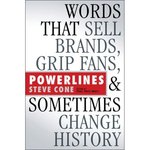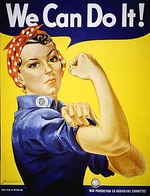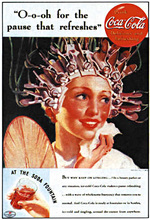Powerlines: How Reagan Won Hearts and De Beers Made a Monopoly
We just finished reading Powerlines: Words That Sell Brands, Grip Fans, and Sometimes Change History, by CMO Steve Cone of Epsilon. (The one with the specs and the grimace.) It's a survey of propaganda that probably helped color the landscape of your life. The last chapter has tips on creating a powerline -- not a guaranteed formula, but still good stuff to keep in mind.
People exposed to an ad will probably pass judgment on it based on the visual and the most visible print. (Typically that's the tagline.) Ad-heads spend plenty of time on pictures, but few consider what impact a resonant string of words can deliver.
A talent for appealing phrases was crucial in the print and radio heydays of advertising. Words suffered waning interest when TV went big -- but in the glory days of digital content and subsites, solid print is back in vogue.
That's not to say you need to waste time scribbling out essays.
A powerline is different from a slogan or tagline. In a way, it's what these things aspire to become. Like viral video, a powerline can't be identified at outset; it earns this title after demonstrating its potency.
To give us a sense of what a powerline feels like, Cone walks us through the origins of nursery rhymes, political slogans, travel promos, ads and jingles. These included Coke's "The pause that refreshes" and "We can do it!" featuring Rosie the Riveter, who drove women into the workforce while men were busy playing guns-and-ammo overseas.
Which president won re-election with "It's morning again in America"? And who enlivened the country with "Happy days are here again"? "Frankly my dear, I don't give a damn," Rhett Butler's famous rebuke of Scarlett, found its way to Tupac in Poetic Justice more than a half-century after Gone with the Wind first hit theatres.
There are also examples of bad and sub-par lines. Among them Cone cites Verizon's "Can you hear me now?" (We disagree with him here. The line wasn't original, but everytime we go "Can you hear me now...?", we still think Verizon. Last year we even switched over from Cingular. Maybe we're just really impressionable.)
The big takeaway: think about the words you associate with your brand and images. Use them to develop a relationship between product and people.
Failing that, it might help to take a look at Steve Cone's Powerlines. It's a light read that, like Facebook, will keep you feeling productive without the pinch of doing actual work.





Comments
And "We can do it!" featuring Rosie the Riveter, who drove women into the workforce while men were BUSY FIGHTING A WORLD WAR! They weren't playing guns and ammo overseas! You let your marxist leaning bleed through and your credibility bled with it.